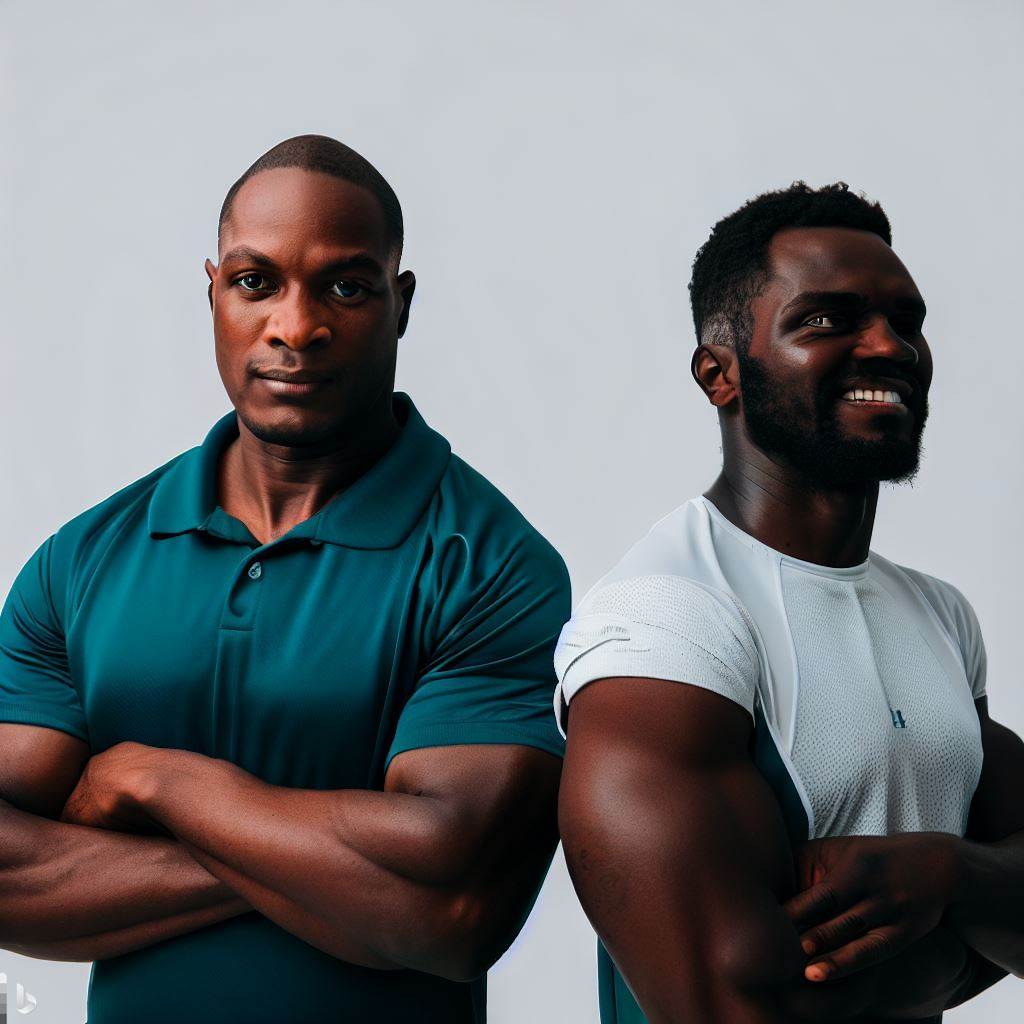Introduction
Let’s explore the role of physical therapist in sports medicine.
As the country embraces sports and physical activity on a broader scale, the responsibilities, contributions and role of physical therapists in Nigeria’s Sport Medicine is taking on new dimensions.
This blog post delves into the dynamic journey of how physical therapists in Nigeria are adapting, innovating, and driving advancements in sports medicine to cater to the unique needs of athletes and active individuals.
From injury prevention to rehabilitation and performance enhancement, their evolving role is shaping the landscape of sports healthcare in the nation.
Definition of sports medicine
Sports medicine is a branch of medicine that focuses on the treatment and prevention of injuries related to sports and exercise.
Importance of sports medicine in Nigeria
The importance of sports medicine in Nigeria cannot be overstated. With the growing interest in sports and the rise of professional athletes, the need for specialized medical care has become crucial.
Sports medicine plays a vital role in ensuring the health and performance of athletes.
Overview of the evolving role of physical therapists in sports medicine
Now, let’s provide an overview of the evolving role of physical therapists in sports medicine.
Physical therapists are highly trained healthcare professionals who specialize in managing and rehabilitating injuries related to sports activities.
They work closely with athletes to develop personalized treatment plans and facilitate their return to peak physical condition.
Physical therapists have traditionally been involved in injury rehabilitation, but their role has expanded over the years. They now play a significant role in injury prevention, performance enhancement, and overall athlete wellness.
They not only treat injuries but also educate athletes on injury prevention strategies and provide guidance on proper training techniques.
In short, the role of physical therapists in sports medicine in Nigeria is continuously evolving. They have become essential members of the sports medicine team, working alongside physicians, coaches, and trainers to ensure that athletes receive the best possible care and support for their physical well-being.
The History of Physical Therapy in Nigeria
Development and recognition of physical therapy as a profession
In the early years, physical therapy in Nigeria was not recognized as a distinct profession. As more awareness about the importance of rehabilitation grew, physical therapy started gaining recognition.
Several healthcare institutions began incorporating physical therapy services into their treatment plans.
In the 1970s, the Nigerian Medical Council officially recognized physical therapy as a profession. This recognition led to the establishment of dedicated physical therapy schools and training programs.
Physical therapists were now able to receive formal education and training in Nigeria.
Various professional bodies, such as the Nigerian Society of Physiotherapy, were formed to support the growth and development of the profession.
The recognition of physical therapy as a profession brought about an increase in the number of practicing therapists in Nigeria.
Initial role of physical therapists in treating injuries in sports
Physical therapists initially played a limited role in treating injuries in sports in Nigeria. They mainly focused on rehabilitation after injuries, helping athletes regain their mobility and functionality.
Physical therapists worked closely with sports medicine doctors and other healthcare professionals to create comprehensive treatment plans.
They utilized various manual therapy techniques, exercise programs, and modalities to aid in the recovery process.
Over time, physical therapists’ role expanded to include injury prevention and performance enhancement. They started working closely with athletes and sports teams to develop rehabilitation programs.
Physical therapists educated athletes about proper body mechanics, injury prevention exercises, and self-care techniques.
They became an integral part of sports medicine teams, providing on-field assessment and immediate care during competitions.
Physical therapists also played a crucial role in sports research, helping identify and address injury patterns specific to Nigerian athletes.
Read: Challenges and Opportunities for Nigerian Veterinarians
The Evolving Role of Physical Therapists in Sports Medicine
Increased Integration into Sports Teams and Organizations
In recent years, there has been a significant shift in the role of physical therapists within Nigeria’s sports medicine field. Gone are the days when these professionals were limited to providing rehabilitation services on an individual basis.
Today, physical therapists are becoming increasingly integrated into sports teams and organizations, playing a vital role in athletes’ overall health and performance.
Physical therapists are now seen as important members of sports medicine teams, working closely with coaches, trainers, and physicians to provide comprehensive care to athletes.
Their expertise in movement analysis, injury prevention, and rehabilitation makes them valuable assets in optimizing athletes’ physical function and minimizing the risk of injuries.
By being a part of sports teams and organizations, physical therapists are able to provide immediate and continuous care to athletes, ensuring timely treatment and effective rehabilitation.
They are present during training sessions, competitions, and even travel with the team to provide ongoing support.
This level of integration allows physical therapists to better understand the specific demands of the sport and tailor their interventions accordingly.
Collaboration with Other Healthcare Professionals
Another important aspect of the evolving role of physical therapists in sports medicine is their increased collaboration with other healthcare professionals.
Recognizing the complex nature of sports injuries and the need for a multidisciplinary approach, physical therapists are now working closely with physicians, orthopedic specialists, nutritionists, and strength coaches to provide holistic care to athletes.
Collaboration with other healthcare professionals ensures that athletes receive a comprehensive treatment plan that addresses not just the physical aspect of their injuries but also factors such as nutrition, mental health, and strength conditioning.
Physical therapists bring their expertise in movement analysis, functional training, and manual therapy to the table, while working alongside other professionals who contribute their specialized knowledge and skills.
This interdisciplinary approach allows for a more accurate diagnosis, better treatment outcomes, and a faster return to play for athletes.
The collective efforts of healthcare professionals help to optimize athletes’ performance, reduce the risk of reinjury, and improve their overall well-being.
Prevention and Rehabilitation Strategies Employed by Physical Therapists in Sports Medicine
Physical therapists in sports medicine excel in both prevention and rehabilitation. They proactively implement injury prevention strategies and design effective rehab programs for athletes’ recovery and return to sport.
In prevention, they conduct screenings to spot potential musculoskeletal issues, addressing movement patterns and providing corrective exercises to enhance performance and lower injury risk.
During rehabilitation, evidence-based techniques, therapeutic exercises, and advanced equipment are used to heal injuries, restore function, and improve athletes’ performance.
Physical therapists also oversee gradual return-to-play plans, adjusting programs as needed and ensuring athletes safely reintegrate into sports.
Their evolving role involves close collaboration with teams and healthcare professionals, focusing on prevention and rehab strategies that optimize athletes’ performance and contribute to sports medicine success in Nigeria.
Challenges and Opportunities Faced by Physical Therapists in Nigeria’s Sports Medicine
A. Lack of Resources and Infrastructure
- Inadequate sports medical facilities hinder optimal care.
- Shortage of advanced equipment limits diagnostic and treatment options.
- Insufficient funding constrains research and development in sports physiotherapy.
- Remote areas lack access to even basic therapy resources.
B. Limited Education and Training Opportunities
- Scarcity of accredited sports physiotherapy programs restricts professional growth.
- Few specialized courses leave therapists with a limited skill set.
- International collaboration can bridge the education gap for Nigerian therapists.
- Online resources offer a convenient way to access knowledge and training.
C. Rising Demand for Skilled Physical Therapists in Sports Medicine
- Surge in sports activities drives the need for experienced therapists.
- Professional sports teams seek well-trained therapists for player care.
- Olympics and international competitions spotlight the importance of sports rehabilitation.
- Opening for entrepreneurial therapists to establish private sports clinics.
Navigating these challenges requires collaboration between government, educational institutions, and sports organizations.
Investment in modern infrastructure and educational opportunities can empower Nigerian physical therapists to deliver exceptional sports medicine services.
As demand surges, therapists must actively seek growth opportunities and leverage online resources for continuous learning.
The evolving role of physical therapists in Nigeria’s sports medicine is not just about overcoming hurdles but also seizing the momentum for a promising future.
Read: An In-Depth Look: Radiation Therapist Profession in Nigeria

Case Studies and Success Stories
Successful rehabilitation of professional athletes
- A famous football player with a severe knee injury was successfully rehabilitated by a physical therapist, allowing him to return to the game.
- A track and field athlete with a chronic shoulder issue was able to compete at a high level again after undergoing physical therapy.
- A basketball player with a recurring ankle injury received effective treatment from a physical therapist, enabling him to continue playing without further setbacks.
- A gymnast with a wrist fracture was rehabilitated by a physical therapist, allowing her to regain flexibility and strength for optimal performance.
- A professional boxer who suffered a shoulder dislocation received expert physical therapy, which not only healed his injury but also improved his overall shoulder strength and stability.
Read: The Journey to Becoming a Registered Nurse in Nigeria
Impact of physical therapy in improving sports performance and injury prevention
- Regular physical therapy sessions can significantly enhance an athlete’s endurance, strength, and flexibility.
- Physical therapists develop individualized training programs that focus on improving specific muscle groups and overall performance.
- Through targeted exercises and techniques, physical therapy helps athletes improve their balance and coordination, leading to better sports performance.
- Physical therapists play a crucial role in teaching athletes proper body mechanics and correct movement patterns to prevent injuries.
- By addressing weak areas and imbalances, physical therapy reduces the risk of future injuries and contributes to a longer sports career for athletes.
The success stories and case studies highlight the crucial role of Nigerian physical therapists in sports medicine. Their expertise not only aids in athlete rehabilitation but also boosts performance and prevents injuries.
Personalized training and guidance on body mechanics not only enhance athletic abilities but also extend careers by minimizing future risks.
These examples underscore the significance of physical therapy in Nigeria’s sports medicine landscape.
Read: Comparative Study: Psychiatry in Nigeria and Other Countries
The Future of Physical Therapy in Nigeria’s Sports Medicine
In order for physical therapy to continue playing a pivotal role in Nigeria’s sports medicine, several key factors need to be considered:
Potential advancements and innovations in the field
- Introduction of cutting-edge rehabilitation technologies to enhance treatment outcomes.
- Exploration of regenerative medicine techniques to accelerate recovery and tissue repair.
- Integration of telehealth services to provide remote consultations and monitor athletes’ progress.
- Implementation of data analytics and artificial intelligence for personalized treatment plans.
The role of government and organizations in supporting the growth of physical therapy
- Establishment of sports medicine centers equipped with state-of-the-art facilities and training resources.
- Allocation of funds for research and development in the field of sports medicine and physical therapy.
- Collaboration with international sports medicine organizations to exchange knowledge and expertise.
- Creation of policies and regulations to ensure the highest standards of practice among physical therapists.
The need for continuous professional development in sports medicine for physical therapists
- Mandatory participation in regular training programs and workshops to stay updated with advancements in the field.
- Encouragement of specialization in sports-related areas such as orthopedics, sports nutrition, and exercise physiology.
- Promotion of research and publication to contribute to the body of knowledge in sports medicine.
- Integration of evidence-based practice guidelines and protocols into daily clinical practice.
The future of physical therapy in Nigeria’s sports medicine is promising, marked by technological innovations and research-driven approaches.
Government backing, international collaboration, and continuous professional development will drive growth.
Well-equipped centers and specialized expertise will elevate athlete care, ultimately enhancing performance and recovery. A united effort is essential to ensure athletes’ well-being and success in Nigeria.
Read: The Changing Landscape of Psychiatry in Nigeria: A Review
Conclusion
A. Recap of Evolution
Physical therapists in Nigeria’s sports medicine have transformed from sideline supporters to integral team members.
B. Crucial Performance Boost
Physical therapy significantly enhances sports performance by optimizing athletes’ strength, flexibility, and endurance.
C. Urgent Research Need
To unlock greater potential, continuous research and development in physical therapy for sports medicine is imperative.
In the end, Nigeria’s sports medicine landscape has witnessed dynamic changes with physical therapists playing pivotal roles.
Their contributions extend beyond injury rehabilitation, fostering peak performance. However, this journey has just begun.
Embracing research-driven advancements will unlock new frontiers for athletes, ensuring a healthier, more competitive future.




